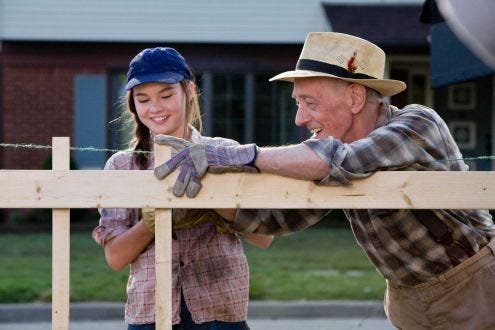Flipped

There’s been a lot of discussion as to whether Rob Reiner is past his prime. In the 80s and early 90s Reiner had a run of 10 years as good as anyone in the history of cinema, but has remained mired in a slump since. In the past 10 years his best film arguably has been “The Bucket List,” a mainstream feel-good that got, at best, a tepid critical reaction.
His latest, the teen romance “Flipped” is not going to signal the return of Reiner as a big-time hitmaker, but, hey, it’s better than “Rumor Has It.”
In “Flipped,” Juli (Madeline Carroll) and Bryce (Callan McAuliffe) are two kids learning the ways of life and love in early 1960s suburbia.
Juli is a dreamer who loves to climb a sycamore tree everyone else seems to think is ugly, has a father (Aiden Quinn) who paints but doesn’t tend to the lawn, and longs to one day share her first kiss with Bryce.
Bryce, on the other hand, has always struggled to fit in. He moved into the neighborhood late, and is embarrassed by Juli hanging all over him.
In short, they’re normal kids.
Based on the young adult novel by Wendlin Van Draanen, Reiner keeps the book’s gimmick of telling the story from Bryce’s point of view, then backing up and letting us see how Juli sees things.
This device failed mightily in the thriller “Vantage Point” a few years back, and it doesn’t fare much better here, and “Flipped” is at its best when it sticks to the straight-and-narrow path.
Carroll and McAuliffe are fun to watch together, and make a fun couple. Juli is fickle about her affections toward Bryce, and he's no better, seeing her as the albatross around his social neck, but later missing her when she's gone.
The rest of the cast is quite solid, with Rebecca DeMornay (“Risky Business”), John Mahoney (TV’s “Frasier”), Penelope Ann Miller (TV’s “Men of a Certain Age”), and Anthony Edwards (TV’s “ER”).
Reiner might have been better served to give his cast more screen time rather than rehashing, scene after scene. One gets the sense he felt a bit trapped by these limitations, as especially the later backtracks tend to be clipped, to-the-point scenes that only highlight what’s different.
Many of the characters are meant to be more archetypal: the distant grandfather, the “strange” family in the neighborhood, and so on, but it would have been nice to have more time to get to know them. The film is at its most interesting when they start breaking out of those molds, but for some characters, specifically Edwards’ stodgy, self-centered father, we get precious too little time to learn their motivations.
“Flipped” shares a timeframe with Reiner’s film “Stand By Me,” and it’s easy to tell Reiner has a fondness for that era and will make an interesting companion piece some day, albeit more of one as a look back on his career than viewing two films of similar quality.
I had a decent enought time watching “Flipped,” though, and in this age of hardscrabble, gritty, hyped-up pictures it was somewhat refreshing to see something so tame (in fact, only a few scant words save it from a G rating).
I'd recommend "Flipped" for older audiences, perhaps grandparents taking the grandkids to a show, or for people looking for a dose of 1950s nostalgia (yes, the film takes place in the early 1960s, but this is strictly "Leave it to Beaver" stuff), or tweens and teens who have read the book and want to compare the versions.
As a Heartland Truly Moving Picture, “Flipped” is certainly a family-friendly affair and is lighthearted and full of whimsy, with just enough of a dose of reality to file down that sugar coating to remain interesting and fun.
